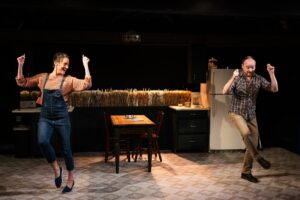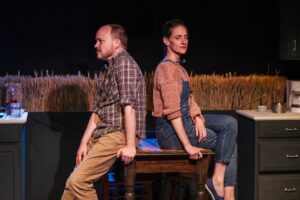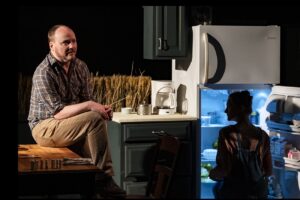The Willa Cather short story that Brenda Withers has adapted as a play is set in a 19th-century Nebraska farm community, but in the Harbor Stage Company’s production of The Bohemian, Withers sets the action in a present-day kitchen. Withers and Jonathan Fielding play nearly a dozen roles without changing costumes. As the actors bake bread, a mesmerizing and tender love story unfolds between Nils Ericson and the woman he returns to, and also between parents and children, and people and the land.

Withers chose this Cather tale in part because it felt familiar, despite differences in location and era. “This is about being connected to a place and leaving it,” Withers says. “That’s a big part of our life on the Cape.”
The Harbor Stage, of which Withers is a co-founder, has staged adaptations of works by Anton Chekhov, Ingmar Bergman, and August Strindberg. For this adaptation, Withers wanted a renowned American voice. She’d long been a fan of Cather’s depictions of Great Plains life among European-immigrant pioneers in the late 19th and early 20th centuries. She’d read most of Cather’s dozen novels and started reading some of the short stories, and she imagined staging possibilities. She settled on Cather’s The Bohemian Girl, published in 1912 in McClure’s magazine. It felt like a “gentle” story for summer 2025, says Withers.
“The world is in a tumultuous place,” says the director, and she wanted a story that could function like a balm. “This is that kind of story. And Willa Cather is that kind of writer.”
In the story, Nils returns to his hometown, where his mother and brothers follow the rhythms of farming. “The people he meets are either deeply connected to that hometown or need to get out of there,” says Withers. “I meet a lot of people like that in Wellfleet — either ‘I would never leave’ or ‘I’ve got to see more.’ So, there is tension.”
Nils’s shy younger brother, Eric, and the woman Nils had loved, Clara Vavrika, are restless among their community of immigrants from Norway and Bohemia (now the Czech Republic) — and torn between their own life choices and Nils’s. Clara is now married to someone else and avoids farm chores, instead playing the piano and riding around the countryside on horseback.
Withers shortened the title to The Bohemian, emphasizing the word’s modern definition and its association with the Outer Cape. She describes Nils and Clara as “people with an independent artistic spirit and wanderlust.”

Withers retains much of Cather’s elegant voice in narrated scenes. The play opens as the story does: “The trans-continental express swung along the windings of the Sand River Valley.” Withers, as narrator, describes Nils — from clothing to expressions — while kneading dough on a rectangular table at center stage. A “teasing, not unkindly smile played over his lips,” says Withers, as Fielding, playing Nils, sits nearby in a kitchen chair.
Table and chairs move to indicate location changes. Once they are reunited, Nils and the restless Clara spar and flirt at her home, at Clara’s father’s bar, and in a cellar. At a community barn-raising, their dancing adds playfulness to the story.
Fielding and Withers create a varied cast of characters with small changes in facial expression, posture, and vocal tones. “We’re creating a community,” Withers says, “and the vibe of the community of characters is more important than each individual. This is a snapshot of the town.”

As a farmer driving Nils home, Withers’s voice becomes gravelly and accented. As Nils’s mother, she stands ramrod-straight at the stove but gives hero-worshipping Eric a more deferential stance. Fielding perfectly embodies Cather’s description of Clara’s aunt Joanna — jolly, sentimental, taking such short steps that she’s likened to a duck. Then he radiates good-humored bluster, adopting a thick accent, for Clara’s father.
The two actors switch off bread-baking duties. In one scene, Withers, as Nils’s mother, pares fruit as family matters are discussed. “Land’s a good thing to have,” Nils says, trying to placate his mother. “Only when you stay on it,” she replies sourly.
Bread-making, as a symbol, positions the home and family as sources of comfort and sustenance. The central family in the story had grown wheat for decades and made something real from it. The linoleum-floored kitchen and the action around kneading bread, waiting for it to rise, turning on a coffeemaker, and pouring cups of coffee was designed, says Withers, to convey the joys of being home even as Nils rejects a life of routine and encourages Clara to flee it with him.
“We know how great it is to come home to mom’s kitchen,” Withers says. “This can be an embrace of that, even while imagining people who ran away are having fun.”
Home Sweet Home
The event: The Bohemian by Willa Cather
The time: Wednesdays through Saturdays through July 5, and Tuesday, July 1, at 7 p.m.; Sundays at 5 p.m.
The place: Harbor Stage Company, 15 Kendrick Ave., Wellfleet
The cost: $25; pay what you can on Friday, June 20
